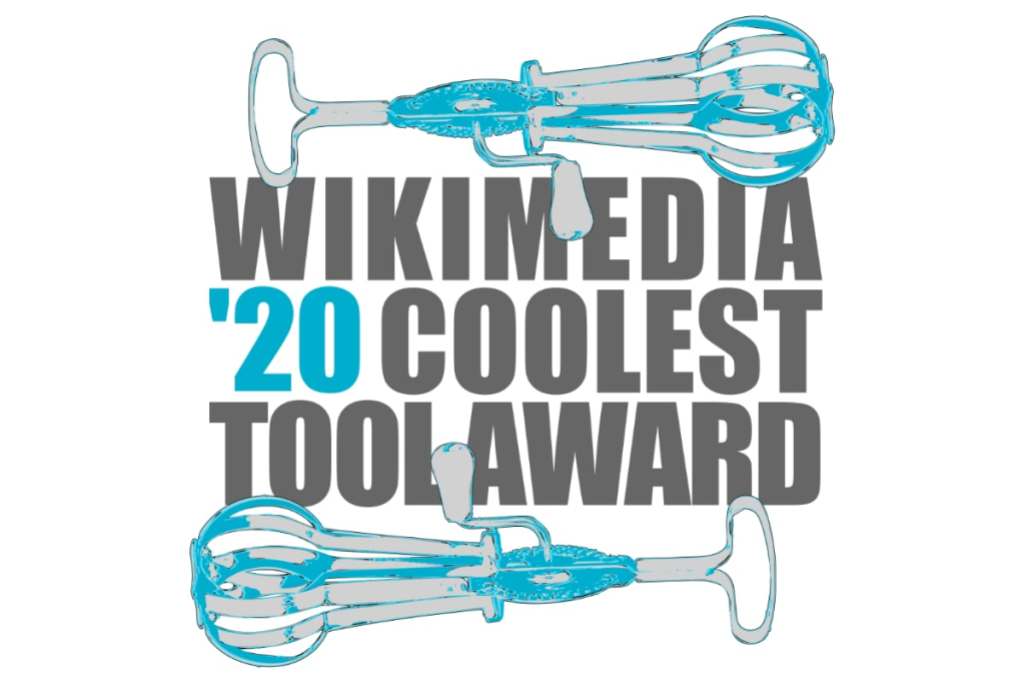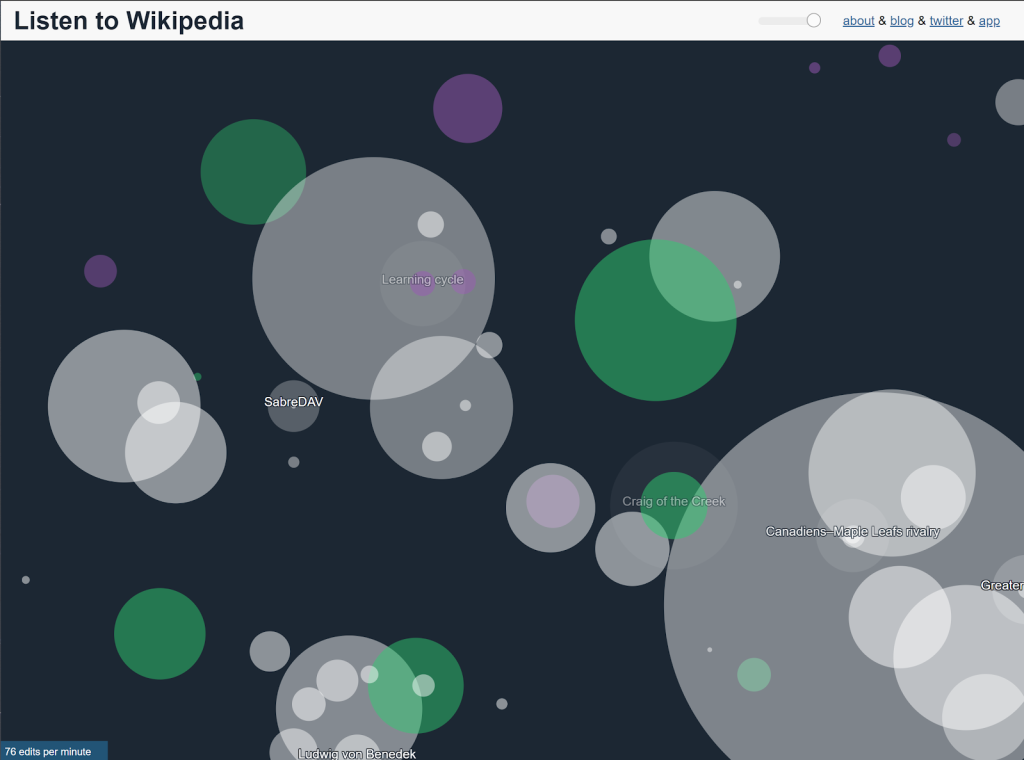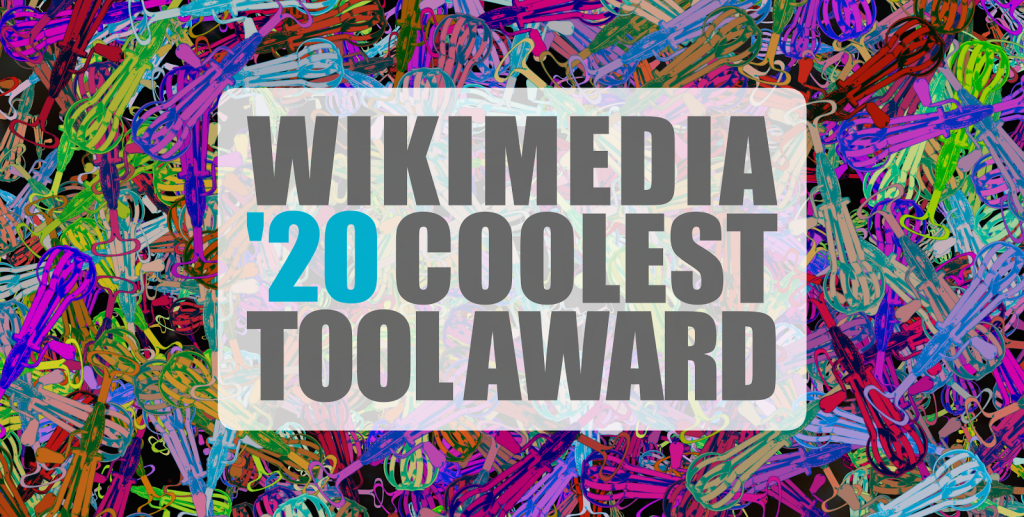For the past two years, the Coolest Tool Awards has celebrated tools created and used by the Wikimedia community. Read about 2020’s winners.
By Joaquin Oltra Hernandez, Staff Developer Advocate, The Wikimedia Foundation
Wiki communities around the globe have diverse use cases and technical needs. Volunteer developers are often the first to find and address those use cases. They experiment with new ideas, build local and global solutions and enhance the experience in our software. The Coolest Tool Award aims to acknowledge that, and make volunteer developers’ work more visible.

The second edition of the Coolest Tool Award happened virtually on 11 December 2020 and was live streamed on Youtube in the MediaWiki channel. The award was organized and selected by the Coolest Tool Academy 2020 and friends.
10 great tools were awarded in the categories Editor, Newcomer, Impact, Experience, Reusable, Quality, Developer, Diversity, Tiny and Eggbeater and 6 more were awarded honorable mentions.
Thank you for all your work! 🎉
2020 winners
Editor — Tools that augment editing
AutoWikiBrowser (📼) –by Bluemoose, Magioladitis, Reedy, Rjwilmsi, Kingboyk– is a semi-automated MediaWiki editor designed to make tedious or repetitive editing tasks quicker and easier.
AutoWikiBrowser has been around for many years helping editors across wikis edit with ease.
Newcomer — New tools or tools by new developers
SDZeroBot (📼) –by SD0001– is a bot that generates collections of userspace reports that streamlines processes –like AFC and NPP by sorting articles by ORES topics and showing an excerpt of the lead section.
The bot started operating in 2020, and it has a lot of potential for providing insightful lists and summaries for many use cases and communities.
Impact — Tools that have broad or deep impact
Extension:Proofread_Page (📼) –by TPT, ThomasV– can render a book either as a column of OCR text beside a column of scanned images, or broken into its logical organization (such as chapters or poems) using transclusion.
It allows easy comparison of text to the original digitization, and it shows the text in several ways without actually duplicating the original text.
The extension is installed on all Wikisource wikis, and it has been used to proofread millions of pages.
Experience — Intuitive and easy to use
Listen to Wikipedia (📼) –by Stephen LaPorte, Mahmoud Hashemi– is a creative, beautiful, playful way of interacting with our data by showing visualizations and sounds based on edits and other events.

Reusable — Serves many wikis and projects
Extension:GlobalUserPage (📼) –by Jack Phoenix, Legoktm– lets you reuse the same user page across multiple wikis in a wikifarm.
At Wikimedia, users with an account can create a global user page for all Wikimedia projects on Meta wiki.
Quality — Tools to improve content quality
Extension:AbuseFilter (📼) –by Daimona Eaytoy, Andrew Garrett, Marius Hoch, River Tarnell, Victor Vasiliev– allows privileged users to set specific actions to be taken when actions by users, such as edits, match certain criteria.
For example, a filter could be created to prevent anonymous users from adding external links, or to block a user who removes more than 2000 characters.
It is a highly versatile tool, developed over more than 10 years that helps wikis all around maintain quality of content.
Developer — Tools that primarily serve developers
Pywikibot (📼) –by xqt, John Vandenberg, Fabian Neundorf, and many others– is a Python library and collection of scripts that automate work on MediaWiki sites. Originally designed for Wikipedia, it is now used throughout the Wikimedia Foundation’s projects and on many other wikis.
Diversity — Tools that help include a variety of people, languages, cultures
Lingua Libre (📼) –by 0x010C– is a project which aims to build a collaborative, multilingual, audiovisual corpus under free license.
You can explore and reuse recordings, contribute to the corpus by recording words, or improve the website itself, in consultation with the community.
Tiny — Small tools and tools that do one thing well
CropTool (📼) –by Dan Michael O. Heggø– is a tool for cropping images at Wikimedia Commons and other Wikimedia sites.
It supports JPEG, PNG, TIFF and (animated) GIF files, can extract single pages from DJVU and PDF files as JPEG for cropping, features automatic border detection, and the result can replace the original file or be uploaded as a new one.
Eggbeater — Tools in use for more than 10 years
XTools (📼) –by user:X!, rewritten by Hedonil, rewritten by MusikAnimal, Mathewrbowker et al.– is a statistics tool that presents and visualizes information about users, articles, and other items in Wikimedia projects.
- You can find it both as a gadget in many language projects or use it directly on Wikimedia Labs.
- Originally developed in 2008, the tool likely bears the name of its original developer, “user:X!”, yet it has been rewritten by many since then.
- Thousands of people use it as a gadget (XTools-ArticleInfo) in English Wikipedia alone.
- Its interface is available in dozens of languages.
XTools gives you an extra dash of motivation to keep going.
Honorable mentions (📼)
Listeria bot –by Magnus Manske– is a lifesaver when it comes to generating lists on Wikipedia, based on Wikidata queries. This handy bot is used by brilliant projects like Women in Red, Wiki Loves Monuments, and many more.
Earwig’s Copyvio Detector –by Ben Kurtovic– No one likes dealing with copyright violations. This amazing tool helps detect possible copyright violations for you.
Wikidata Lexeme Forms –by Lucas Werkmeister– In the words of a user of this tool “Very convenient way to add lexemes to Wikidata. As easy as playing Tetris.” Even more, it has multiple language support.
Convenient Discussions –by JWBTH (Jack who built the house)– allows the user to post and edit comments without switching to a separate page. The users of this tool said they didn’t know how they could live without it. Convenient Discussions, you are loved!
Wudele –by Jean Frédéric– is a deployment of Framadate (a free/libre software to schedule events and create polls) on the Wikimedia Cloud Toolforge.
Entity Explosion –by Toby Hudson– is a browser extension to discover links and information about the topic of a webpage using data from Wikidata. As one reviewer wrote: “Taking the power of Wikidata with me wherever I go across the web!”
—
Huge thanks to everyone who took the time to nominate their favorite tools and everyone who spread the word about the Coolest Tool Award!
For more details on the awarded projects, please see the Coolest_Tool_Award/2020 page.
See you next year! 😄
Joaquin — for the 2020 Coolest Tool Academy

Originally published by Joaquin Oltra Hernandez on the Wikimedia Tech blog on January 14, 2021

Can you help us translate this article?
In order for this article to reach as many people as possible we would like your help. Can you translate this article to get the message out?
Start translation